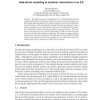Free Online Productivity Tools
i2Speak
i2Symbol
i2OCR
iTex2Img
iWeb2Print
iWeb2Shot
i2Type
iPdf2Split
iPdf2Merge
i2Bopomofo
i2Arabic
i2Style
i2Image
i2PDF
iLatex2Rtf
Sci2ools
105
click to vote
EDM
2008
2008
Data-driven modelling of students' interactions in an ILE
This paper presents the development of two related machine-learned models which predict (a) whether a student can answer correctly questions in an ILE without requesting help and (b) whether a student's interaction is beneficial in terms of learning. After presenting the rationale behind the development of these models, the paper discusses how the data collection was facilitated by the integration of different versions of the ILE in realistic classroom situations. The main focus of the paper is the use of the ICS algorithm of WEKA to derive Bayesian networks which provide satisfactory predictions. The results are compared against decision trees and logistic regression. The application of these models in the ILE and how their potential educational consequences were taken into account are outlined followed by a discussion of future lines of research.
| Added | 29 Oct 2010 |
| Updated | 29 Oct 2010 |
| Type | Conference |
| Year | 2008 |
| Where | EDM |
| Authors | Manolis Mavrikis |
Comments (0)

